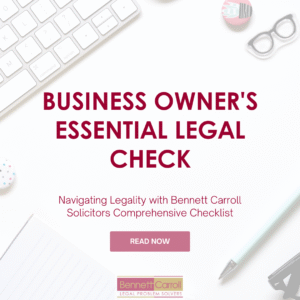Below is a practical checklist for private lenders to follow when conducting due diligence on borrowers before entering into a loan agreement with them. These action points are designed to help you, as the lender, mitigate risks and ensure the security of your investment. Not every step will be commercially appropriate to take in every matter, but if a step is taken, it should be completed quickly, thoroughly and documented for future reference.
1. Borrower Identity and Personal Background Verification
- Verify the borrower’s identity using government-issued photo identification (e.g., passport or driving licence). 100 points of ID is the bare minimum obligation at law placed on the lender if they intend to secure their loan by way of a mortgage.
- The verification of identity check is usually a trigger for discovering whether the buyer is foreign and therefore may be subjected to additional controls.
- Conduct face-to-face verification of the borrower’s identity if at all possible.
- Confirm the borrower’s residential address and history.
- For corporate borrowers, verify the identities of directors and authorised signatories.
- Note that it is generally safest to assume all documents are fraudulent until proven otherwise. Certified copies helps mitigate this risk, or sighting the originals in-house (or having us do so).
2. Financial History and Capacity
- Request and review comprehensive financial statements from the borrower.
- Obtain copies of recent bank statements (6–12 months) to assess cash flow.
- Check the borrower’s credit history and credit score through a reputable credit agency (e.g., Experian).
- Review tax returns for the past 2–3 financial years to confirm income sources.
- Calculate the borrower’s debt-to-income ratio to assess their repayment capacity.
- Ask for details of any outstanding debts or credit commitments.
- Conduct a bankruptcy search and PPSR search on every borrower. Their full legal name/s and dates of birth are required to do so.
3. Legal Status and Compliance
- Confirm that the borrower has the legal capacity to enter into a loan agreement. This is very commonly overlooked, at a lender’s peril. Incapacity can and does void loan agreements.
- For corporate borrowers, obtain an ASIC extract to verify registration details.
- Check whether there are any regulatory actions, restrictions, or compliance issues involving the borrower.
- Search insolvency and wind-up registers to confirm the borrower is not bankrupt or insolvent, or about to become so.
If you’re considering a private loan arrangement as part of a business sale, check out our guide on What to Include in a Business Sale Agreement.
4. Existing Obligations and Legal Proceedings
- Investigate whether the borrower has existing financial obligations that could impact repayment capacity.
- Ask if the borrower has provided guarantees for other loans or financial arrangements.
- Check if there are any ongoing or pending litigation matters involving the borrower.
- Search for court judgments or regulatory proceedings against the borrower.
- Whether the buyer is a company, trust, individual or something else, always run their name through the court registries to ensure they are not being sued. This may put them at risk of a recovery effort by a third party and resulting loss of assets. The lender’s rights will be in imminent mortal peril if there are proceedings on foot to appoint a liquidator or bankruptcy trustee. If any proceedings involving the borrower are discovered, ask for copies of the court documents to see what role the borrower has in the litigation, as well as evidence (if applicable) that the matter has been finalised; ideally a document, such as a Notice of Discontinuance, which bears the original seal of the relevant court.
5. Security and Collateral Assessment
Property Security
- Conduct a title search on any property offered as security to confirm ownership.
- Verify that there are no fraud concerns related to the property ownership.
- Check for existing mortgages, charges, writs, warrants or other encumbrances on the property.
- Obtain rates and land tax searches to confirm there are no obvious outstanding liabilities concerning the property.
Valuation and Condition
- Arrange an independent professional valuation of any security property to confirm its market value; ideally at the borrower’s expense and capitalised into the loan value.
- Conduct building and pest inspections if applicable.
- Confirm zoning, planning permissions and permitted use of the property (particularly if the property is not the borrower’s principle place of residence i.e. home).
- Assess whether the property is marketable in case of default.
Priority Position
- Ensure there are no prior-ranking interests that could affect your priority position as a lender.
- Obtain consent from prior mortgagees if applicable. Often, a deed of priority between the mortgagees is required.
Flow-through
- Consider taking a registered security interest, for example by way of the PPSR All-PAP charge, over any persons or entities who benefit indirectly from the loan (related parties of the borrower e.g. collateral companies or trusts they are involved in).
- If you are taking security over land by way of mortgage, include a clause requiring that your mortgage flow through to any subdivided lot created from the parent parcel, to avoid a subdivision or development approval creating hurdles to you maintaining security.
6. Purpose of Funds Verification
Loan Purpose Assessment
- Request a detailed explanation of how the loan funds will be used (e.g., refinancing, business investment, property purchase).
- If refinancing, verify details of existing loans being repaid with your funds.
- If for business purposes, request a business plan and assess its viability.
Funds Disbursement Control
- Implement controls to ensure funds are used for their stated purpose (e.g. directing payment to third parties such as outgoing mortgagees or for payment of adjustments relating to the secured property).
- Document how funds will be disbursed and to whom, to mitigate misappropriation risk.
7. Corporate Borrower Specific Checks (if applicable)
Corporate Structure
- Obtain an ASIC extract to confirm company registration details.
- Request documentation regarding company structure and beneficial ownership (e.g., shareholder agreements). Generally, verification of identity ought to be conducted on the directors.
Jump to: Shareholder Disputes in Queensland: A 5-Part Legal Guide
Corporate Compliance
- Review board resolutions authorising the loan transaction, or minutes of a general meeting of the shareholders, as may be appropriate or necessary.
- Occassionally, review the company constitution to check if certain powers have been delegated away from the directors or additional compliance (internal to the borrower) is required to properly enter the loan agreement.
- Confirm that the company is in good standing with regulatory authorities.
- Ensure the company is appropriately licensed for the industry it operates within.
- Check the company is appropriately insured for the usual risks it’s business faces, so that if those risks manifest the lender is not the one holding the bag.
Trust Structures (if applicable)
- If security property is held in trust, request a certified copy of the trust deed.
- Verify that the trustee has authority to borrow on behalf of the trust.
- Ensure appropriate trustee resolutions have been passed authorising the loan transaction.
8. Insurance Requirements
Security Property Insurance
- Confirm that adequate insurance coverage is in place for any security property offered by the borrower (e.g., building insurance). The lender should have powers; to request their interest be noted on the policy, to ensure the borrower only uses reputable and solvent insurers, to obtain from the borrower a certificate of currency with respect to the insurance and to compel the borrower to seek additional coverage over time as the value of the property changes (or the use the borrower puts the property to changes).
Other Insurance
- Consider requiring life insurance or income protection insurance for individual borrowers where appropriate. This is standard in many countries, particularly in Europe, but is less common in Australia owing to the superannuation system, as most retail funds provide TPD & Death insurance as part of the offering.
9. Independent Legal Advice
Borrower Legal Understanding
- It is always recommended that the borrower obtain independent legal advice regarding their obligations under the loan agreement. This is such a highly effective risk transfer mechanism for lenders that many now expressly require it, as opposed to merely recommending it to a borrower.
Loans between family members? Protect your interests with a Binding Financial Agreement.
Solicitor’s Certificate (if required)
- Ensure that a solicitor’s certificate is obtained confirming that the borrower understands their obligations under the loan agreement.
- Additional Risk Mitigation Measures
Character Assessment
- Request references from reputable sources who know the borrower professionally or personally.
Reputation Verification (for business borrowers)
- Investigate industry reputation if lending for business purposes.
Jump to Bennett Carroll – Commercial Law
Final Thoughts
This checklist provides a structured approach for private lenders to conduct due diligence on borrowers before entering into a loan agreement. By completing each step thoroughly, you can reduce risks associated with lending and protect your financial interests. Remember to document all findings and decisions throughout this process for transparency and legal compliance.
Every matter is unique. The following is general advice only and should not be relied upon without first discussing the novel nature of your matter with one of our experienced solicitors.
Need Legal Advice on Private Lending?
At Bennett Carroll Solicitors, we have extensive experience advising private lenders on risk mitigation strategies, loan structuring, and compliance issues. Contact us today for a confidential discussion about your lending needs.
Private lending arrangements can impact your estate planning. Read more in Estate Planning Essentials for Business Owners.
Contact Bennett Carroll Solicitors
If you’re a private lender or investor seeking expert legal advice to minimise risk and secure your investments, our experienced team at Bennett Carroll Solicitors is here to help.
We have offices conveniently located across Queensland to serve you better:
-
Stafford
-
Upper Mount Gravatt
-
Kawana
-
Mermaid Beach
-
Appointment-only offices in Ipswich and Brisbane Central
Reach out today to schedule a consultation and get tailored advice for your lending needs.
Phone: 1300 334 56 or Contact us here

Other Suggested Websites
- Binding Financial Agreements: Protecting Assets & Future Security
- ASIC (Australian Securities and Investments Commission)
- AFCA (Australian Financial Complaints Authority)
- MoneySmart (Government financial guidance)
- PPSR (Personal Property Securities Register)







